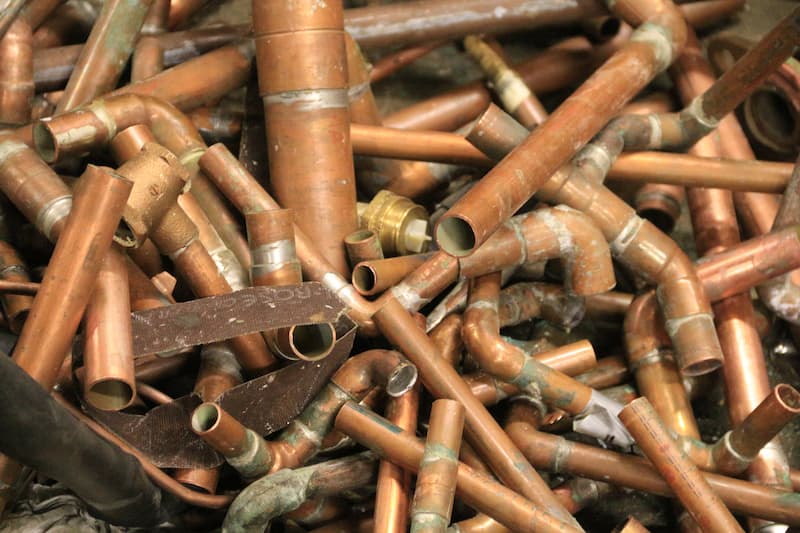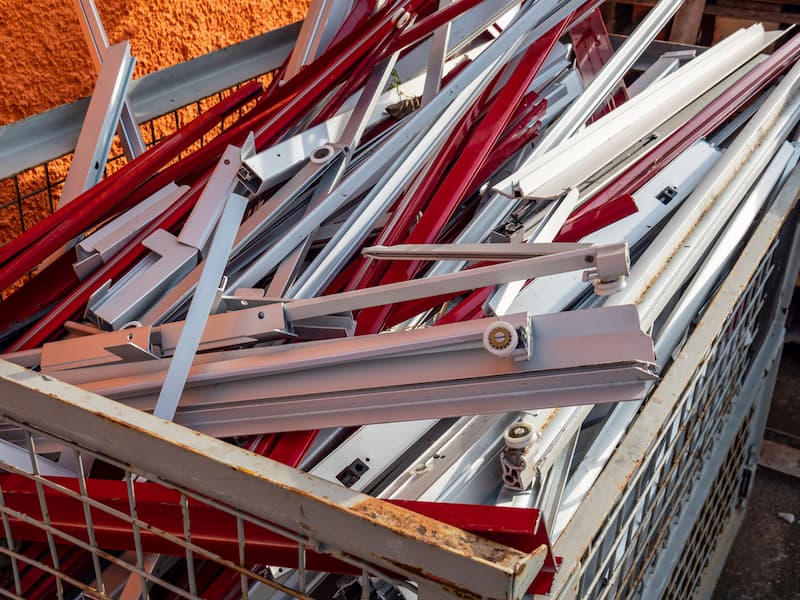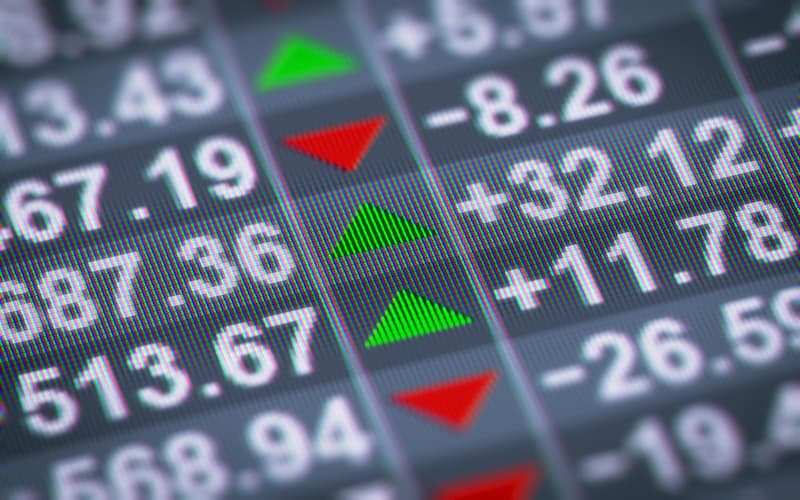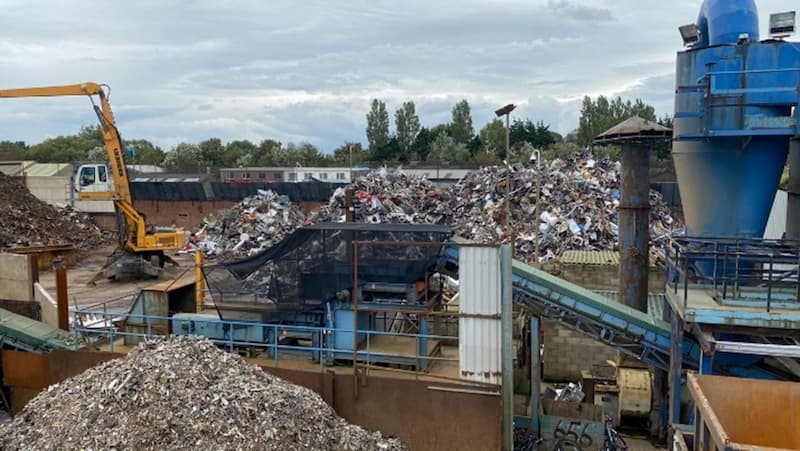Many businesses accumulate scrap metal – an often overlooked valuable asset. With over 35 years of experience in the scrap metal industry, we’re committed to helping businesses understand the intrinsic value of metals they often disregard.
For businesses eager to make the most of their scrap, we’ll provide practical tips and cues for identifying metals and understanding the fluctuating market values that dictate their worth. As experts in scrap metal recycling, we’ll also delve into the unique characteristics of different valuable metals like copper, brass and aluminium – all commonly found, yet frequently undervalued, in many trade businesses.
Types of Valuable Metals
Each type of metal has its own value, and identifying those which could bring you a significant income by using responsible scrap metal buying establishments like us, could bring you a healthy income.
Copper – The King of Scrap Metal
Copper, often regarded as the king of scrap metal, is in high demand due to its extensive use in multiple industries. Its diverse uses, recyclability, and constructive properties make copper a highly sought-after resource. Copper is commonly found in electrical wires, plumbing fixtures, decorative pieces, and old pipework. The metal’s identifiable characteristics include its distinctive reddish colour, heft, and non-magnetic properties. Recognising copper can significantly benefit those looking to capitalise on their scrap.
Brass – The Hidden Treasure In Old Cars
Not limited to musical instruments or decorative items, brass – a copper and zinc alloy- is often a hidden gem in older vehicles’ components and various household items. Known for its golden-like aesthetic, durability and anti-corrosive nature, brass can fetch a good price in the scrap industry. Tools, keys, antique furniture fixtures, and car radiators are some places where this overlooked metal might be found. So, if you have old vehicles in your yard, consider our end-of-life-vehicle recycling services and get cash for your old cars.
Aluminium – The Lightweight Winner
Aluminium is ubiquitous, from beverage cans and foils in our kitchen to doors, gutters, siding, and window frames in homes. Identifying aluminium is simple; its lightweight, whitish-silver colour and resilience to corrosion (usually forming a thin, white layer of aluminium oxide) make it easy to distinguish from other metals. Turning in aluminium scrap can transform what might appear as mere trash into valuable treasure.
Tips for Identifying Valuable Scrap Metals
Trade businesses are often a treasure trove of valuable scrap metal. To maximise the return of your scrap metal, being able to collect large amounts of each type will help. Whilst there are various types of metal, they fall into two categories: ferrous and non-ferrous. The ferrous recycling process differs greatly from the non-ferrous metals, so separating these can also provide a better return.
Here are some practical tips and visual cues to help identify these hidden gems:
- Use a Magnet: Generally, ferrous metals (those containing iron) are magnetic. This includes metals like steel and iron. Non-ferrous metals such as copper, aluminium, brass, and stainless steel are not magnetic. A simple magnet test can help identify the type of metal you’re dealing with.
- Check the Colour: Copper is typically reddish, aluminium exhibits a light, whitish-silver hue, and brass often has a yellowish, gold-like colour. Identification through colour is a basic yet useful way to distinguish between various metals.
- Weight Matters: Aluminium is lighter than many other metals, while copper and brass are noticeably heavier. Learning to gauge the weight of various metals can aid your identification process.
- Look Out for Markings: Some metals, like copper wiring and pipework, may have identifiable markings or labels which can help in identification.
- Age of Materials: Older vehicles, plumbing fixtures, and electrical systems often contain higher quality metals – like brass and copper — compared to their newer counterparts.
- Corrosion Appearance: Metals react differently to the elements. Copper may develop a green patina, aluminium forms a white, powdery residue, and iron/steel will typically rust.
The Ever-Changing Value of Scrap Metal
The value of scrap metal doesn’t remain constant but fluctuates for various reasons. Understanding the factors that change scrap metal prices can help you make informed decisions when selling your scrap.
Factors Affecting Scrap Metal Value
- Market Demand: As with all commodities, market demand heavily influences the price of scrap metals. If there’s a high demand for a particular metal, its value will go up, while lower demand will cause the price to decrease. For example, increasing construction activities may create higher demand and pricing for metals like steel or copper.
- Condition of the Scrap: Clean and sorted scrap fetches better prices than mixed scrap or scrap containing impurities. For instance, insulated copper wires have lower value than their stripped counterparts, as removing insulation requires extra effort for recycling facilities. Keeping your scrap well-organised and separated could result in higher returns.
- Location and Buyer: Scrap metal prices may also vary depending on location and the buyer. You may notice regional price differences – urban facilities often offer higher prices due to increased competition, while rural scrapyards may offer lower prices due to the absence of competition. Furthermore, it’s essential to work with reputable buyers, like Morecambe Metals, to ensure fair pricing.
Understanding how the value of scrap metal fluctuates helps sellers make educated choices about when to sell and where to maximise their returns. As scrap metal value is intimately interconnected with global events and trends, it’s crucial to remain well-informed about market developments and forecast future price changes.
How Morecambe Metals Can Help
We have perfected a process that provides efficient and maximum returns for your scrap metal value, thanks to our extensive experience. With our advanced Eddy Current Separation technology and state-of-the-art metal shredding and shearing facilities, we can process various types and quantities of metals. We understand that transporting scrap metal can be challenging, which is why we offer an efficient scrap metal collection service with a modern fleet of wagons. Our hassle-free pick-up service covers Lancashire, Cumbria, and Southern Scotland, and we take pride in providing personalised and high-quality services to our customers.
With 35 years of experience in scrap metal recycling and processing, we’re a family-run business that values expertise, resources, and dedication to customer service. The British Metals Recycling Association fully licenses us and adheres to UK health and safety standards. Our commitment to offering top-notch services prepares us to turn your scrap metal into cash. So, for all your scrap metal needs, contact our team, who will find a solution to suit your business.





